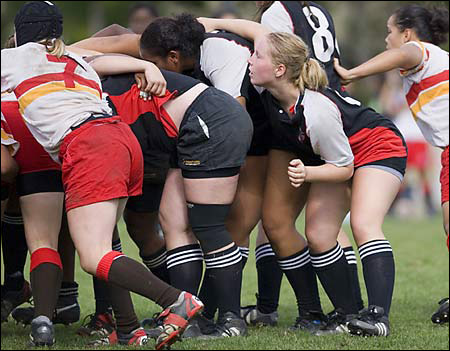One team, 37 strong
Contact, camaraderie, and do-it-yourself ethic rule Radcliffe Rugby
Out of the dozens of club offerings annually pitched and promoted to Harvard’s freshman class, what would possess Cambridge’s newest residents to sign up for rugby – that brutal pastime favored on the other side of the pond? More perplexing still, why are some of Harvard’s newest female students clamoring to join the scrum (and more often than not, sticking it out for four long years)? A longstanding desire to rebel, perhaps; or maybe it’s the sheer novelty of the sport; or another ticket to well-roundedness. The real answer, it seems, is not nearly so complicated. To tweak Carville’s famous phrase, “It’s the contact, stupid.” Or so proclaim a good majority of the Radcliffe Rugby Football Club’s (RRFC) team members, now 37 strong.
“Harvard is a stressful place,” explains Le’Shera Hardy, a junior who joined the team her freshman year. “It’s a good place to act your aggression out,” she says about the comforts of the pitch. Plus, Hardy adds dryly, she likes the physical intensity.
Longtime devotee of the game, Darlene “Bubba” Connors, who has coached the Division 1 team (aka “Radrugby”) for the past 16 years along with a rotating cast of assistants, has a more esoteric explanation. “There’s a cerebral element that lends itself to a Harvard student,” says Connors, a former rugger on the U.S. national team, about the sport. “There’s a continuity and flow – you have to keep the ball alive. It’s like chess with the body.”
Despite these varying assessments of what compels a portion of Harvard’s female student body to take up a game that fundamentally sanctions mowing down your opponent – albeit safely and within the rules (but sans pads, nonetheless) – Connors and her charges find some common ground in the sport’s tendency for building extreme team unity. Indeed, as a club sport relying solely on the collection of small dues, RRFC is by necessity a do-it-yourself operation that depends on the efforts of the group. Team members are forced to multi-task, interchangeably serving as equipment managers, water girls, Web masters, strategists, statisticians, promoters, and cheerleaders. On the field, meanwhile, the club’s wings, props, flankers, full backs, hookers, and scrum-halves rely squarely on one another, a sentiment echoed by coach Connors. “There’s no star,” she says. “Fourteen people have to do their job before the 15th can score.”
Such camaraderie proved to be a big selling point from the outset for freshman Rachel Calixte, who admitted to not knowing a thing about the sport prior to joining: “The vets were so welcoming. I immediately felt a part of the team.” For Brittany Farr ’10, a track athlete in high school, rugby offers a far richer opportunity for bonding and fellowship than her previous sport of choice. Though initially intimidated by the stampede-like atmosphere of the game, Farr now reports to love the inclusive aspects of the game, and vows to stick with it.

Veterans of the game concur. “Initially as a freshman I chose to stick with sports I had played in high school, so I did J.V. softball and J.V. volleyball,” explains senior co-captain Aimee Gough. “I found that these teams lacked the sense of camaraderie and team spirit that I loved in high school.” Looking for a change her sophomore year, Gough checked out one of the club’s bi-weekly practices. Soon after, Gough confesses, she was hooked.
Begun in 1982, a good five years before many of the team’s newest recruits were even born, RRFC has slowly become, to aptly quote the team Web site, “a team to be reckoned with in the Northeast.” Indeed, winners of the collegiate national championship in 1998 (the team’s first), coach Connors and company have since qualified for nationals over the past two seasons. Currently ranked fifth out of the dozen teams in their division, Radcliffe – which fields an A and B side for every match (required by the New England Rugby Football Union, the sport’s regional governing body, to give all players a chance to play) – has put together a 3-2 record since play kicked off in mid-September. Most recently, the A team (whose victories and losses alone count toward league standings) knocked off Providence College, 40-15. The Black and White’s postseason fate now rests on the outcome of this Saturday’s (Oct. 28) away contest opposite the University of Massachusetts, Amherst. It’s a must-win.




